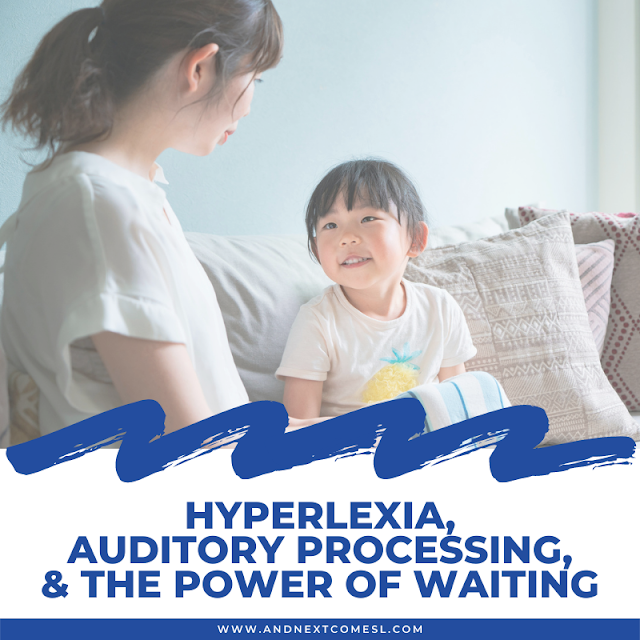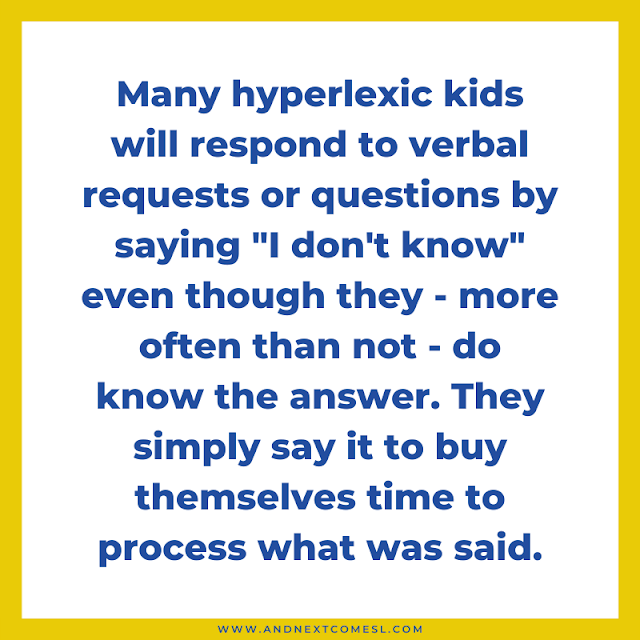Auditory processing delays are one of those lesser known characteristics of hyperlexia that doesn't get discussed nearly enough. But many forget that the challenges hyperlexic kids face with comprehension also apply to auditory or listening comprehension as well.
While I've discussed hyperlexia and auditory processing strategies before, I do want to dive deeper into one strategy in particular. The second strategy on that list of strategies is to give them time to respond. And that's what I'd like to focus on here.
See, when you ask a hyperlexic child a question, they might give you a response of "I don't know" or they might say nothing at all. So you repeat the question. Or you prompt them with a way to respond. Or you just assume they don't know and move on in your conversation. They do usually know, by the way. It's just that their default "I don't know" script is what they do to buy themselves more time (more details on that here).
Basically, what ends up happening though is that you are often prompting them or repeating the question before they've even had enough time to process what was said, let alone formulate a response.
So that's why we're going to talk about the power of waiting when it comes to helping hyperlexic kids with auditory processing.
But First...Some Important Notes About Hyperlexia & Auditory Processing
As I already mentioned, auditory processing issues are quite common with hyperlexic kids. It's not surprising given the well documented challenges with answering WH questions and with comprehension in general. So it's something to be aware of if you have a hyperlexic child.
Often, hyperlexic kids will default to saying "Huh?" or "I don't know" whenever they are spoken to (read more about the "I don't knows" here). Even if it's a question they do in fact know the answer to. The reason why they do this has to do with auditory processing. They're using the script of "I don't know" as a coping mechanism in order to buy themselves more time to process and make sense of what was said to them. More on that here (see point #3).
Speaking of buying themselves time, did you know that autistic and hyperlexic children have a "response delay of 11 milliseconds in processing sounds heard in words?" (source: Drawing a Blank by Emily Iland).
As Iland points out, although "the lag is brief, it means that the [autistic child] may still be processing the first syllable of a word when other students in class have already processed the entire word." But then those "delays may cascade, and the [autistic child] may lag further and further behind when trying to capture the message during a longer conversation or lesson."
So imagine if you were to interject by prompting or repeating the question while they're still processing those words and sounds...Well, you essentially end up cutting them off before they've even had time to absorb all of the incoming information. Unhelpful, right?
Often, we're too quick to repeat the question, prompt them, and/or assume they didn't understand us. In other words, our kids are "just not getting the chance to communicate," as Fern Sussman writes in More than Words.
Since many hyperlexic kids (if not all!) have trouble processing and understanding spoken language, it's important to remember to pause and wait. After all, our hyperlexic kids often aren't given enough time to process and respond to what was said to them. Remember that 11 millisecond delay?
That's why one of the best things you can do is wait and give the hyperlexic child time to respond.
So let's talk about the power of waiting and why it's helpful for these kids.
The Power of Waiting to Help Hyperlexic Kids with Auditory Processing
In the book More than Words, Fern Sussman writes, "Waiting will give your child enough time to send messages in her own way...[it] can also give your child a chance to take in and think about what you are saying."
Simply put, waiting gives them time to process what was said. So always try to pause after saying something and then wait a few more seconds just to be sure. If you would normally pause for 2 seconds, try pausing for 5 or 6 or even 10 instead. Let there be a moment of awkward silence for as long as your child needs.
By simply pausing and waiting, you're also not adding any additional demands on your child. As Linda K. Murphy said in her Declarative Language Handbook, "If you speak again too quickly, you add more demands and create more work. The child might get overloaded, get stuck, or not know what to do."
In other words, speaking too soon might cause overload and anxiety for your child. Not only do they have to try and make sense of what you said initially, but now they somehow have to process what else you added. They might also get frustrated because you never let them respond to the first question and now they suddenly have more to respond to. Waiting will reduce those feelings of overwhelm, anxiety, and frustration.
Waiting also means you respect the hyperlexic child's unique learning style. You're showing them that you not only understand how they learn and process information, but that you value their attempts to communicate and will wait patiently for them to do so.
A Recap of the Power of Waiting to Help with Auditory Processing
Now, whether you're a skim reader (I see you!) or you simply want a recap of all that was discussed above, this section is for you. Here's what you need to know about hyperlexia, auditory processing, and the power of waiting:
- Hyperlexic kids often have trouble processing and understanding spoken language so it's important to remember to pause and wait after speaking
- Waiting gives your hyperlexic child time to process what was said and time to respond in their own way
- When pausing, always wait a few extra seconds (e.g., if you normally pause for 2 seconds, try pausing for 5-10 seconds instead)
- Speaking too soon while they're still processing what was said can create additional demands and work for your child and they might get stuck because of it
- Waiting a few extra seconds can help reduce feelings of overwhelm, anxiety, and frustration
- Pausing and waiting shows that you respect and value the hyperlexic child's unique learning style and their attempts to communicate
So the next time you're tempted to prompt or ask a question again, simply pause and wait. You might be surprised how effective it is.
Other Hyperlexia & Auditory Processing Related Resources You'll Love
5 Strategies to Help Hyperlexic Kids with Auditory Processing







